1.2K
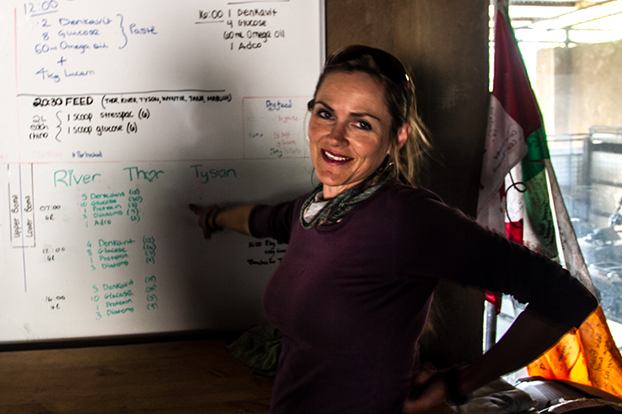
| Petronel Nieuwoudt is the owner and manager of the largest rhino rehabilitation sanctuary in the world, Care for Wild Africa, one of Konica Minolta South Africa’s CSI partners. And she lives there too. Aren’t you afraid, I ask. Of poachers I mean. “No, I’m not afraid,” Petronel says. “God didn’t give us a spirit of fear.” So much of Petronel’s personal philosophy is inspired by the natural world. Like the idea that “fear” is manmade. “Watch the animals,” she tells me, “they do what they are here to do without living in a state of fear.” 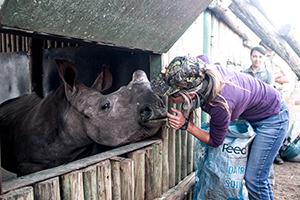 Even if she was fearful (sometimes), I doubt that would stop a woman like Petronel who was born into the old stock; the type of folk who believe unwaveringly in the principle that every person is here for a reason. Petronel’s reason, at this point in time, is to save a species. Petronel speaks as much about spirituality as she does about science, and she certainly isn’t shy about her sacred feminine qualities in the company of some of South Africa’s most prominent male wildlife veterinarians, anti-poaching generals and conservationists. 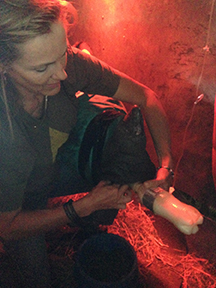 She tells me about the time that she ordered her partner, Chris, out of bed in the early hours of a winter’s morning, ordering him to strip down to his underpants and lie next to a month-old orphan rhino in order to support the baby rhino’s body temperature. “You can laugh,” she says, “but in the absence of a mother for that calf, in the absence of a textbook that tells you how to save a stressed rhino, and in the absence of anyone else who wants to wake up at 3am on a remote farm in Mpumalanga, you do what you have to do to keep that animal alive.” I wish there were more people who were born to the old stock. I tell Petronel this and we discuss the fact that young South Africans can’t rest on their laurels. Whether it’s fighting for education, fighting against corruption or fighting for the rhino, there is an urgent need for individuals to wake up to their “reason” and respond to a world that needs them. 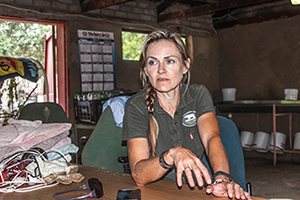 “Do you know how much you must still do?” she asks me directly. “We are not here to simply pass through.” I wasn’t surprised to learn that Petronel grew up on a farm in rural Limpopo province in the 1970s. “Roedtan” is the name of the town, says Petronel, giving a beautiful roll to the ‘r’. Her mother was a teacher and both of her parents were liberals who had a love of conservation and wildlife. “I knew from a young age I had a calling,” says Petronel. “When I left the farm I went to the Rand Afrikaans University and studied journalism. I then moved on to industrial psychology and communications.” 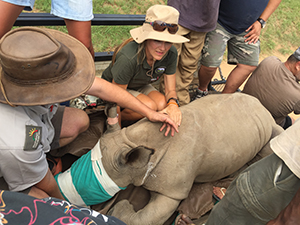 That very specific combination was enough to get Petronel a job in the public relations department of the then South African Police Service’s Endangered Species Protection Unit. Petronel moved up the ranks, moving into the undercover unit and becoming a captain. She’s no longer in the force, but the day before I had this conversation with Petronel she had taken a call from a friend who still is. She told me there are 400 rhino poaching cases that are active crime scene investigations in South Africa. “When I heard that number I said to my friend, ‘It’s too much, how do you do it?’ and he replied ‘It’s a calling Petronel’ and that’s all he had to say.” “We don’t do this for the money or the glory,” Petronel laughs. So when did you step out of the force Captain Nieuwoudt? I ask. Petronel answers: “I remember standing next to the carcass of a rhino one day. I realised that I didn’t want to work on this side of the poaching story, chasing the criminal. I wanted to work with people and with the animals that were still alive.” 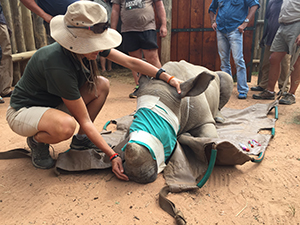 In 2001, with her training in the chemical immobilisation of wildlife, Petronel started a game capture school in Limpopo, which included a breeding project of rare antelope. Ten years later, Petronel’s husband was redeployed to Nelspruit in Mpumalanga and Petronel founded a wildlife rehabilitation centre called Care for Wild Africa that took in a variety of animals. “In 2011, rhino poaching was not as bad as it is today,” says Petronel. “When a female rhino was poached leaving an orphan behind, the policy was that nature must take its course. But there were many private owners of rhino in the area, and when mothers died or rejected their calves, I would get a call. The rhino calf would come to the sanctuary and I would look after it until it was well enough to be released back onto the private farm from where it came.” In 2012, as the rhino-poaching crisis worsened, the “no interference” policy was changed and national parks started actively looking for solutions for orphaned rhino. Petronel’s sanctuary had a number of advantages not least of all the fact that she is one of only a handful of experts in South Africa who has experience in the care of orphaned and injured rhino. 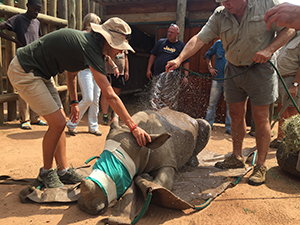 Today, with a total of 26 rhino, Care for Wild Africa is now the largest rhino sanctuary in the world and Petronel is part of a team of South Africans writing the textbook of rhino rehabilitation and release. The sanctuary is located on more than 2,000 hectares of wildlife reserve and orphaned rhino that have been with Petronel for years are now roaming free, returning to the safety of the bomas at night. “Will God give you something you can’t handle?” asks Petronel. The question sums up all that I admire about Petronel. She knows why she is here and never doubts the passion that drives her forward. Her reason is her reason. And that’s enough. As for my initial question (aren’t you afraid?) Petronel has taken a number of steps to protect the sanctuary, including dehorning the rhino, changing the guard roster often, intensifying security around the bomas and deploying community informants. 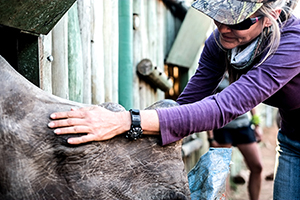 Deploying informants, I ask surprised. How do you do that? “Remember,” she says. “Don’t underestimate a woman who was once a captain in the police.” Just recently I passed Petronel in Nelspruit. She was on her way to drop off a blood sample with a wildlife vet who had come from Johannesburg. Our bakkies stopped next to each other and our windows dropped. I knew we didn’t have much time for small talk. How is everything? I asked. “Poachers tried to get in last night.” she replied. “They didn’t win.” Sorry to hear that. How did you stop them? “I woke Chris up and we deployed our security team fast enough to scare them. I have to run, I think we have another baby arriving today.” And off Captain Nieuwoudt goes. Helping to save a species. And believing that she will. |